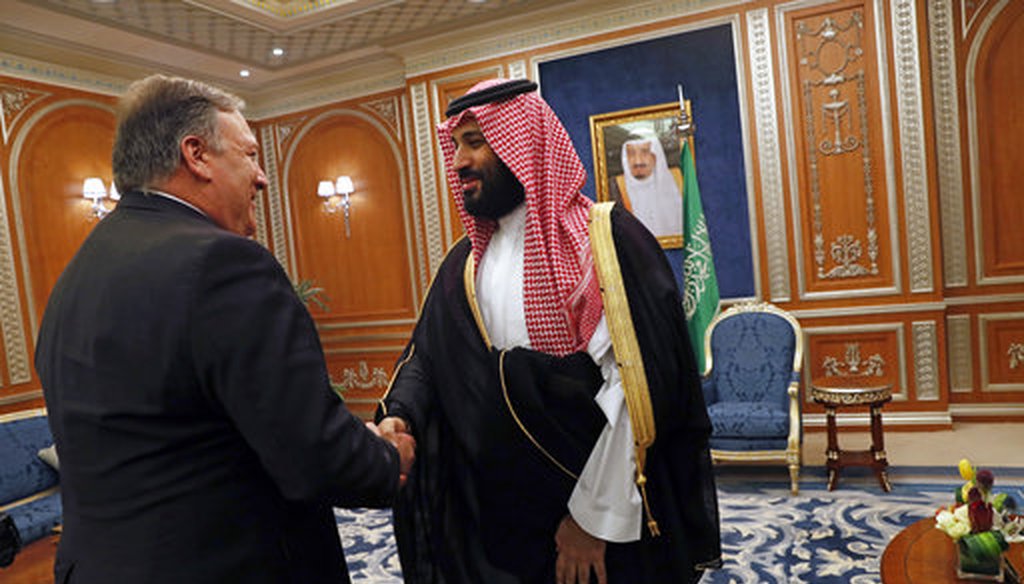Stand up for the facts!
Our only agenda is to publish the truth so you can be an informed participant in democracy.
We need your help.
I would like to contribute

U.S. Secretary of State Mike Pompeo shakes hands with the Saudi Crown Prince Mohammed bin Salman in Riyadh, Saudi Arabia, Oct. 16, 2018. (Leah Millis/Pool via AP)
Lawmakers are growing increasingly frustrated with President Donald Trump’s mixed messaging over the disappearance and suspected murder by Saudi agents of Washington Post columnist and Saudi dissident Jamal Khashoggi. But they have ways to force Trump into action.
In the two weeks since Khashoggi vanished after entering the Saudi consulate in Istanbul, Trump has vowed "severe punishment" if the Kingdom were found to be complicit, and dispatched his Secretary of State Mike Pompeo to Riyadh.
Yet he also appeared to give the benefit of the doubt to Saudi rulers’ denials, and echoed an unproven theory that "rogue killers" may have been responsible.
One of Trump’s strongest allies in the Senate, Republican Lindsey Graham of South Carolina, said he was certain that Saudi leadership was behind Khashoggi’s fate.
"I know this: Nothing happens in Saudi Arabia without MBS knowing it," Graham said, referring to Crown Prince Mohammed bin Salman. "This guy is a wrecking ball. He had this guy murdered in the consulate in Turkey and to expect me to ignore it? I feel used and abused."
Sign up for PolitiFact texts
Graham declined to advise Trump on how to proceed, but added that he plans to "sanction the hell out of Saudi Arabia."
Here are some options Congress has to force a more aggressive response.
Global Magnitsky Act and direct sanctions
The 2016 Global Magnitsky Act contains a provision that allows Congress to ask the president to carry out investigations of suspected human rights violations, with the option for follow-up sanctions.
More than 20 senators — including the top Republican and Democratic members of the Senate Foreign Relations Committee — sent a letter to the White House Oct. 10 asking Trump to probe the circumstances surrounding Khashoggi’s disappearance.
Under the law, Trump is required to order an investigation into whether a human rights violation against Khashoggi occurred, and report back to Congress within 120 days.
However, some legal experts, as well as former President Barack Obama, who signed the bill into law in 2016, believe the Global Magnitsky Act represents an unconstitutional encroachment of executive power. It’s never been tested in court before.
If the courts found the Global Magnitsky Act violated the constitutional separation-of-powers, Congress would still have the option of adopting a new sanctions bill that targets Saudi Arabia directly.
"Congress could always legislate sanctions," said Rob Berschinski, a senior vice president at the advocacy group Human Rights First and a former official in Obama’s State Department.
Block arms sales to Saudi Arabia
Since World War II, the United States has been a major supplier of weapons and military hardware to Saudi Arabia. But if Congress so desired, it could make the U.S.-Saudi arms trade relationship more complicated.
The 1976 Arms Export Control Act carves out a role for lawmakers with respect to major weapons sales to foreign countries. It creates a duty to notify Congress 30 days in advance of any major transfer of defense equipment or military services to a non-NATO partner.
During that period, Congress can pass legislation that either blocks or modifies the proposed sale, though such a move would need enough support to override a presumptive presidential veto, notes the Congressional Research Service.
In 1986, Congress tried to block President Ronald Reagan from transferring a large arms package to Saudi Arabia that included hundreds of Stinger missiles and launchers — a controversial weapon at the time. Lawmakers failed to muster enough votes to override a presidential veto. However, Reagan agreed to drop the Stinger missiles from the arms deal.
Trump has claimed $110 billion in defense sales to Riyadh are in the pipeline — a figure we previously found was exaggerated by perhaps more than 50 percent. Whatever the pricetag, future arms sales to Saudi Arabia could represent a pressure point for Congress.
"There's not enough money in the world for us to buy back our credibility on human rights if we do not move forward and take swift action," said Sen. Marco Rubio, R-Fla., who called for a strong U.S. response to Khashoggi’s disappearance. "Arms sales are important not because of the money but because it also provides leverage over their future behavior."
Prohibit U.S. cooperation with Saudi operations in Yemen
Since 2015, the United States has played a supporting role in Saudi Arabia’s military campaign against Iranian-backed Houthi rebels in Yemen.
Sen. Jeff Flake, R-Ariz., has threatened that Congress could curtail the supply of weapons, intelligence and logistical support in the campaign as punishment if Khashoggi were found to have been killed by the Saudi agents.
"I do think that arms sales will be affected," Flake said on ABC’s This Week. "Certainly our involvement in Yemen with Saudi Arabia will be affected."
Procedurally, Congress could do this by inserting a provision into an upcoming spending bill, said Gregory Koger, a political science professor at Miami University.
"They could attach a rider to the final fiscal year 2019 appropriations bill in December or later that prohibits U.S. cooperation with Saudi operations in Yemen," he said.
Hold hearings
Lawmakers could also use the power of the bully pulpit by holding hearings that shine a spotlight on the issue.
"They could call Jared Kushner and Mike Pompeo to explain U.S. policy toward press freedom and Saudi Arabia," Koger said.
Sen. Chris Murphy, D-Conn., in a Washington Post opinion piece, called for a number of measures against Saudi Arabia, and also backed the idea of holding hearings.
"We should hold hearings on Saudi Arabia’s suppression of domestic dissent," Murphy wrote, "and highlight the cases of dozens of other journalists and activists who have been silenced as part of Mohammed’s campaign against his critics."
Our Sources
PolitiFact, "Can Congress force Donald Trump to investigate missing Saudi journalist?" Oct. 16, 2018
PolitiFact, "Did Donald Trump's trip create or save 'millions' of jobs?" May 26, 2017
Congressional Research Service, "Arms Sales: Congressional Review Process," July 25, 2017
Sen. Chris Murphy, D-Conn., via the Washington Post, "We must demand accountability for Saudi Arabia’s behavior," Oct. 15, 2018
Sen. Lindsey Graham, R-S.C., Fox & Friends, Oct. 16, 2018
Interview with Rob Berschinski, senior vice president for policy at Human Rights First, Oct. 15, 2018
Email interview with Gregory Koger, a political science professor at Miami University, Oct. 15, 2018














































